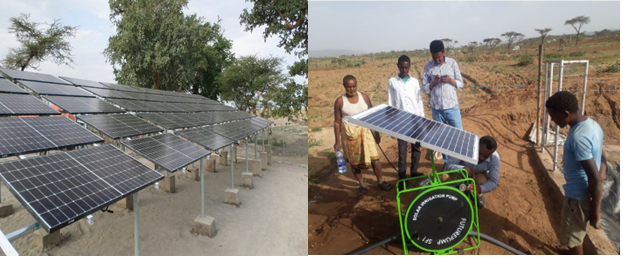The livelihoods of smallholder farmers in Ethiopia have been significantly impacted by climate change, as the country's agriculture heavily relies on rainfall. To improve the capacity of smallholder farmers to cope with climate change risks, MoA, ATI, GGGI and etc. implemented/ promoted the adoption of solar-powered irrigation systems among farmers.
Solar-powered Irrigation Systems

The case was implemented in selected woredas of Oromia (Liben Chikuala and Adami Tullu) woredas), Amhara (Bahir Dar Zuria Woreda), South Ethiopia (Arba Minch Zuria Woreda and Somali regional states (Gursum Woreda).
According to estimates, Ethiopia possesses over 5 million hectares1 of land that are suitable for gravity irrigation purposes, along with abundant water resources that are well-suited for irrigation. However, it is important to note that irrigated agriculture accounts for a mere 3% of the overall national food production. This is primarily due to a range of constraints, resulting in less than 5% of cultivated land being utilized for irrigation purposes.
The vulnerability of smallholder farmers has been significantly impacted by climate change, leading to substantial challenges for their livelihoods. Considering the ongoing challenges posed by climate change, the implementation of irrigation has emerged as a prominent strategy to address food and income shortages, while simultaneously improving the livelihoods of farmers in Ethiopia. Hence, it is imperative to argue the existing rain fed agriculture with solar irrigation to address the challenges posed by climate change and guarantee the long-term viability, environmental sustainability, and adaptability of numerous smallholder farmers, while meeting the needs of a growing population reducing the gap between supply and the demand by enhancing renewable energy utilization both for productive activity and energy for cooking.
The case aimed to provide support to smallholder farmers in Ethiopia in developing climate-resilience, enhancing productivity and food security, promoting clean and energy-efficient alternatives to diesel-run irrigation pumps, and implementing efficient water management through landscape rehabilitation and appropriate irrigation practices. In addition, there was extensive technical training provided to farmers and agricultural experts on the operation and maintenance of solar-irrigation systems. These efforts strived to contribute to poverty alleviation, creation of green jobs, enhanced nutrition and health, and reduced greenhouse gas emissions. There are many private companies that supply and install solar irrigation systems in the country such as Davis & Shirtliff Group, Dumsel Trading PLC, Electo Light PLC and ACME Engineering PLC.
The case accomplishments encompass the purchase and installation of small-scale and large-scale solar irrigation systems. These systems have proven beneficial to approximately farmers, consisting males and females. By enabling the cultivation of vegetables and other crops on significant size of land, these systems contribute to the farmers' resilience against the impacts of climate change. The farmers' capacity was improved, and they gained a comprehensive understanding of the economic and environmental advantages associated with solar irrigation pumps.
Implementing a participatory approach that engages key stakeholders and prioritizes capacity building is crucial for the successful promotion of solar irrigation technologies among farmers. Furthermore, appropriate business model involving financial institutions, development partners, government stakeholders, and private companies fosters adoption of the technology among smallholder farmers. Customized capacity building and training of local technicians is also important to ensure effective and sustainable operation and utilization of the technology among the farmers.
Basically solar irrigation pumping technically used renewable energy available without limitation. Once the technology is properly installed, it can be used by farmers to compensate the shortage of rainfall due to the influences from climate change. As the world experiences indicate this technology is feasible, economically viable and environmentally sustainable technology, as revealed by key informant interviews and relevant document analysis.
Overall, solar irrigation pumping system has many advantages unlike the diesel pumps, including:
- Low maintenance requirements
- Almost no running cost
- No fuel dependence
- Unattended operation
- Zero pollution (no emissions, no spills, no waste)
- Produce best during sunny weather when water is needed most.
- No noise produced.
- Long lifetime (more than twice that of conventional technologies)
- Can be easily relocated, moved, or expanded.
- Easy installation
- Easy for transportation as it can easily be assembled and disassembled.
In Ethiopia, farmers use diesel generators for irrigation pumps, which use fossil fuels imported from abroad. As the number of farmers who use diesel generators increases, climate change is aggravated due to GHG emissions. Due to this fact, solar irrigation technology has been welcomed by a number of different stakeholders. The capacity of government specialists from federal to local levels has been improved, the capacity of farmers has been improved, and they have profited from solar irrigation. In addition, the assessment demonstrated the potential of solar irrigation systems in Ethiopia for the purpose of improving climate-smart agriculture and ensuring food security, as pointed out during key informant interviews and document analysis.
Ethiopia is endowed with a significant amount of solar energy year-round, presenting a valuable opportunity to harness this resource for the purpose of generating electricity to support productive activities in rural regions of the country. Furthermore, the abundant water resources and cultivable land within the country can be effectively utilized for irrigation purposes, thereby enhancing agricultural productivity. In addition, considering the accessibility of these resources within the nation, smallholder farmers exhibit a keen interest in leveraging solar technology to enhance agricultural productivity. As a result of the effects of climate change, rain fed agriculture alone is insufficient to effectively address the country's food and nutrition insecurity issue. Additionally, the escalating cost of fuel presents a significant obstacle to the implementation of conventional technology-based irrigation systems. However, robust capacity building and strengthening the linkage among key stakeholders is required to widely promote solar irrigation pumping and scale-up the technology appropriately.
Due to the economic and environmental benefits of solar irrigation systems, there are many opportunities to obtain funding from several donors that promote support initiatives related to climate change mitigation and adaptation, including Global Environmental Facility (GEF), SIDA, USAID, and Global Climate Fund (GCF).

